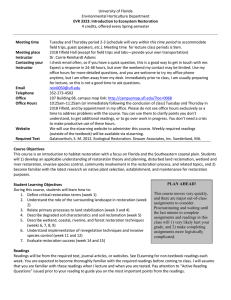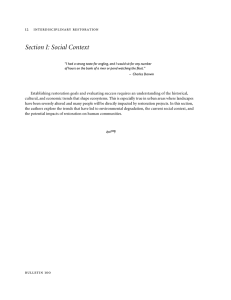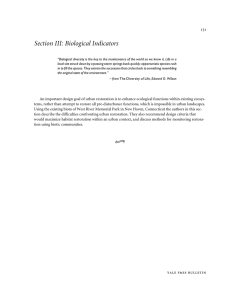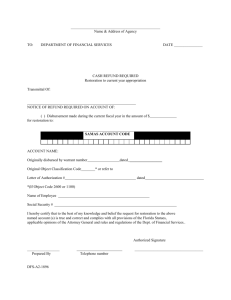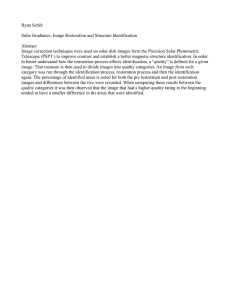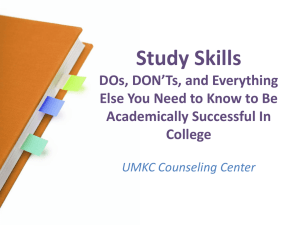University of Florida Environmental Horticulture Department 3 credits, offered every Spring
advertisement
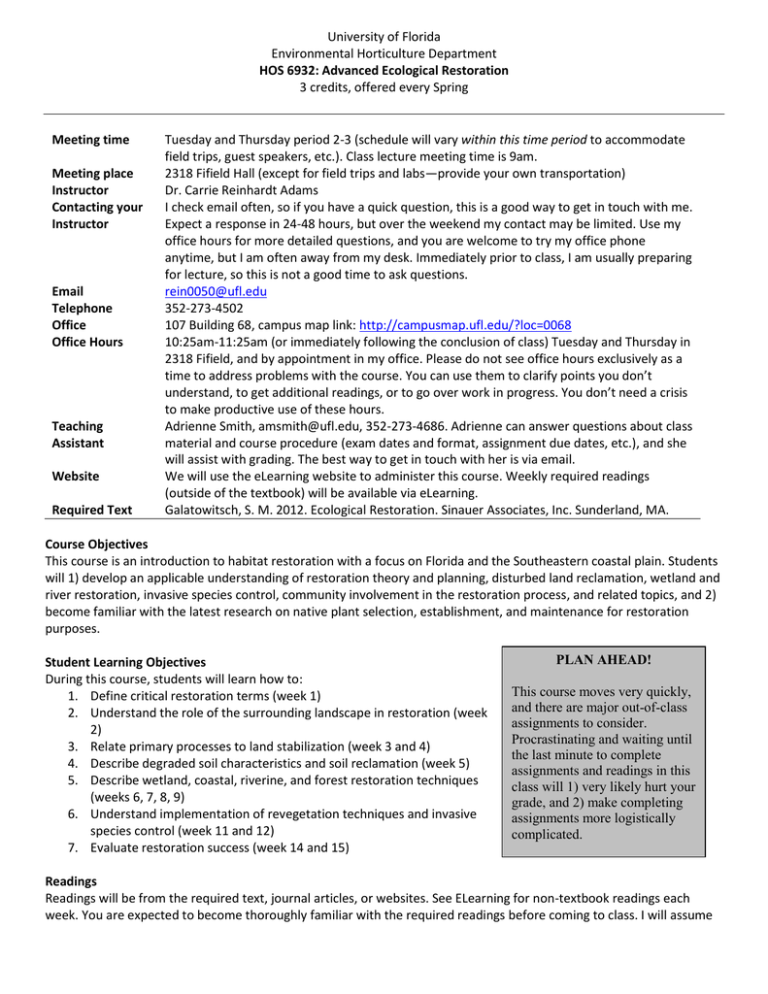
University of Florida Environmental Horticulture Department HOS 6932: Advanced Ecological Restoration 3 credits, offered every Spring Meeting time Meeting place Instructor Contacting your Instructor Email Telephone Office Office Hours Teaching Assistant Website Required Text Tuesday and Thursday period 2-3 (schedule will vary within this time period to accommodate field trips, guest speakers, etc.). Class lecture meeting time is 9am. 2318 Fifield Hall (except for field trips and labs—provide your own transportation) Dr. Carrie Reinhardt Adams I check email often, so if you have a quick question, this is a good way to get in touch with me. Expect a response in 24-48 hours, but over the weekend my contact may be limited. Use my office hours for more detailed questions, and you are welcome to try my office phone anytime, but I am often away from my desk. Immediately prior to class, I am usually preparing for lecture, so this is not a good time to ask questions. rein0050@ufl.edu 352-273-4502 107 Building 68, campus map link: http://campusmap.ufl.edu/?loc=0068 10:25am-11:25am (or immediately following the conclusion of class) Tuesday and Thursday in 2318 Fifield, and by appointment in my office. Please do not see office hours exclusively as a time to address problems with the course. You can use them to clarify points you don’t understand, to get additional readings, or to go over work in progress. You don’t need a crisis to make productive use of these hours. Adrienne Smith, amsmith@ufl.edu, 352-273-4686. Adrienne can answer questions about class material and course procedure (exam dates and format, assignment due dates, etc.), and she will assist with grading. The best way to get in touch with her is via email. We will use the eLearning website to administer this course. Weekly required readings (outside of the textbook) will be available via eLearning. Galatowitsch, S. M. 2012. Ecological Restoration. Sinauer Associates, Inc. Sunderland, MA. Course Objectives This course is an introduction to habitat restoration with a focus on Florida and the Southeastern coastal plain. Students will 1) develop an applicable understanding of restoration theory and planning, disturbed land reclamation, wetland and river restoration, invasive species control, community involvement in the restoration process, and related topics, and 2) become familiar with the latest research on native plant selection, establishment, and maintenance for restoration purposes. Student Learning Objectives During this course, students will learn how to: 1. Define critical restoration terms (week 1) 2. Understand the role of the surrounding landscape in restoration (week 2) 3. Relate primary processes to land stabilization (week 3 and 4) 4. Describe degraded soil characteristics and soil reclamation (week 5) 5. Describe wetland, coastal, riverine, and forest restoration techniques (weeks 6, 7, 8, 9) 6. Understand implementation of revegetation techniques and invasive species control (week 11 and 12) 7. Evaluate restoration success (week 14 and 15) PLAN AHEAD! This course moves very quickly, and there are major out-of-class assignments to consider. Procrastinating and waiting until the last minute to complete assignments and readings in this class will 1) very likely hurt your grade, and 2) make completing assignments more logistically complicated. Readings Readings will be from the required text, journal articles, or websites. See ELearning for non-textbook readings each week. You are expected to become thoroughly familiar with the required readings before coming to class. I will assume 2 that you are familiar with these readings when I lecture and when you are tested. Pay attention to “Active Reading Questions” issued prior to your reading to guide you on the most important points from the readings. Lectures You are expected to be familiar with lecture slides and resulting supplemental explanation and discussion in class; these are all potential exam material. For students who may want to print slides to facilitate note-taking, lecture slides will be posted by 12 noon on the day before class on the ELearning website. Guest Lectures/Field Trips Understanding restoration requires considering many points of view and visualizing situations. Therefore, guest lectures and field trips are extremely valuable to your learning experience in this course. We are fortunate to have a number of guest lecturers who will bring a wealth of experience to the course. Exam questions will be based on material presented during field trips and guest lectures. For field trips, weather may be unpredictable and uncomfortable. Please dress for field trips keeping in mind that we will be outside for almost an hour at a time, and how much you learn during the field trip will likely be positively correlated with how comfortable you are. Make sure you will be warm enough/cool enough and dry enough (waterproof jacket), and wear sturdy shoes. Assignments Major Assignment: FOR! Conference In the second half of the course, we will hold a mock-scientific meeting of the Florida Organization for Restoration (FOR!) in which students present case studies in restoration, detailing pitfalls, success stories, and everything in between. Students will be assigned to groups to complete 15-minute presentations and to address 5 minutes of questions from the audience. Your grade for this major assignment will be based on your group’s evaluation of your contribution, your peers’ evaluation of your presentation, and instructor evaluation. Detailed description of the assignment to follow. Class Participation Exercises There will be several opportunities for class participation throughout the semester, including informal opportunities, such as contributing to class discussion, and formal in-class group activities, such as active learning exercises, and groupauthoring potential exam questions. Calculation of your class participation grade is quantitative, based on materials resulting from the formal in-class activities that are turned in to the instructor. You will have approximately 15 opportunities to participate, and your grade will be based on the percentage of activities in which you actively participate in supporting group activities. Additionally, graduate students are expected to take a mentoring/leadership role where appropriate in this class, e.g. help undergraduates identify plant species (or use a key to do so) in the field, draw on your research experience during class discussions, and provide guidance where applicable during formal in-class group activities. Peer Teaching Exercise (graduate section only) Teach peers about a selected topic in an engaging and thought-provoking manner by producing a 10 minute PowerPoint© slide set and transcript of narration for each slide. These slide sets will be combined to create a real lecture (exam-worthy) for this course on current issues in Ecosystem Restoration. The lecture will be narrated by the instructors using your transcript and presented to your peers during week 14 (April 9-11). Detailed assignment description to follow. Exams There will be three exams covering course material. Exams will consist of multiple choice, essay, and short-answer questions. During lecture, I will solicit potential test questions from the class based on the information presented in class. Exams will consist of several of these questions, as well as questions authored by myself. Exams are not cumulative, though some higher-level thinking questions may require integration of key concepts from previous exam periods. Expectations for Exams (graduate section only) 3 Graduate students will be held to higher standards than undergraduate students for open-ended exam questions (i.e. short answer, definition, essay). The expectation is that answers will be as complete as possible and demonstrate integration of class material into the larger field of ecosystem restoration. Grading Total Points Date Peer Teaching Project 25 Apr 9-11 In-class activities 12 Throughout the semester Exam 1 15 Jan 31 Ecosystem snapshot assignment 3 Feb 21 Exam 2 15 Mar 12 FOR! presentation 15 Apr 9-11 (other due dates throughout the semester) Exam 3 15 Apr 23 Total 100 Letter grades will be assigned as follows (note: 89.5 will be rounded to 90, 84.5 will be rounded to 85, etc): 94% and above A 74% - 76 C 90-93% A70-73% C87 - 89% B+ 65% - 69 D+ 84 - 86% B 60% - 64 D 80-83% BBelow 60% E 77 - 79% C+ For more information on current UF grading policies for assigning grade points, see https://catalog.ufl.edu/ugrad/current/regulations/info/grades.aspx Attendance Policy I do not take attendance in class. However, excessive absence will result in missed class participation opportunities (that cannot be made-up) that will significantly impact your grade. It is almost impossible to get a good grade in this course with excessive absence. When a student misses class, it is his/her responsibility to get notes and handouts from other classmates; it is not the instructor’s responsibility to provide students with missed materials. Make-up Exam and Late Assignments Policy Make-up exams will only be offered to those who obtain permission from me in advance, and who have a legitimate excuse. If you are unsure whether or not your situation qualifies, come see me immediately. I will generally require independent verification for emergencies that arise after the class meeting prior to the exam (e.g. doctor’s note). The same policy holds for in-class activities. For assignments not turned in on time, 10 percentage points will be subtracted from the original grade for each day that the assignment is late. An assignment is considered late if it is not handed in by the beginning of the class period (8:30am) on the day the assignment is due. General Course Policy I hope that this will be an exciting and stretching learning experience for you. To that end, I want to be as clear as possible about my expectations. It is each student’s responsibility to become familiar with this syllabus and to be aware of scheduled exams and assignment due dates (exam dates will not change, though readings, topics and field trips may need to be amended for logistic reasons). Be active participants in your own learning. Think about course material as it relates to the larger world in which you live. I expect you to attend class unless serious circumstances prevent that. I (Incomplete) An incomplete will be assigned at the discretion of the instructor when, due to extraordinary circumstances, a student is prevented from completing the work of the course on time. A written agreement between the instructor and student prior to the end of the semester is necessary to arrange for completion of the course. Students with Disabilities Students requesting classroom accommodation must first register with the Dean of Students Office. The Dean of Students Office will provide documentation to the student who must then provide this documentation to the Instructor when requesting accommodation. 4 Academic Honesty, Software Use, Services for Students with Disabilities, UF Counseling Services Academic Honesty: The University requires all members of its community to be honest in all endeavors. Cheating, plagiarism, and other acts diminish the process of learning. When students enroll at UF they commit themselves to honesty and integrity. Your instructor fully expects you to adhere to the academic honesty guidelines you signed when you were admitted to UF. As a result of completing the registration form at the University of Florida, every student has signed the following statement: “I understand the University of Florida expects its students to be honest in all their academic work. I agree to adhere to this commitment to academic honesty and understand that my failure to comply with this commitment may result in disciplinary action up to and including expulsion from the University. “ Furthermore, on work submitted for credit by UF students, the following pledge is either required or implied: “ On my honor, I have neither given nor received unauthorized aid in doing this assignment.” It is to be assumed that all work will be completed independently unless the assignment is defined as a group project, in writing by the professor. This policy will be vigorously upheld at all times in this course. Software Use: All faculty, staff, and students of the University are required and expected to obey the laws and legal agreements governing software use. Failure to do so can lead to monetary damages and/or criminal penalties for the individual violator. Because such violations are also against University policies and rules, disciplinary action will be taken as appropriate. Campus Helping Resources: Students experiencing crisis or personal problems that interfere with their general well-being are encouraged to utilize the university’s counseling resources. Both the Counseling Center and Student Mental Health provide confidential counseling services at no cost for currently enrolled students. The Counseling Center is located at 301 Peabody Hall (next to Criser Hall). Student Mental Health is located on the second floor of the Student Health Services in the Infirmary. For further information on services and how to make an appointment, call the Counseling Center at 392-1575 or Student Mental Health at 392-1171. See the following web sites for additional resources: Counseling Center: www.counsel.ufl.edu and Student Mental Health: http://www.hsc.ufl.edu/shcc/smhs.htm The Dean of Students Office provides individual assistance to students with documented disabilities based upon the need and impact of the specific disability. There is no requirement for a student to self-identify his/her disability. However, students requesting classroom accommodations must register with the Dean of Students Office in 202 Peabody Hall, 392-1261 (Voice) 3923008 (TDD). Resources are available on campus for students having personal or lacking clear career and academic goals, which interfere with their academic performance. These resources include: 1. University Counseling Center, 301 Peabody Hall, 392-1575; personal and career counseling; 2. Student Mental Health, Student Health Care Center, 392-1171, personal counseling; 3. Sexual Assault Recovery Services (SARS), Student Health Care Center, 392-1161, sexual assault counseling; and 4. Career Resource Center, Reitz Union, 392-1601, career development assistance and counseling. Every generation receives a natural and cultural legacy in trust from its ancestors and holds it in trust for its descendants. This trust imposes upon each generation the obligation to conserve the environment and natural and cultural resources for future generations. The human species faces a grave obligation: conserve this fragile planet Earth and its human cultural legacy for future generations. We now recognize that humans have the power to alter the planet irreversibly, on a global scale. Human must be concerned with the condition of the planet that is passed to future generations. E. Brown-Weiss Environment April 1990
